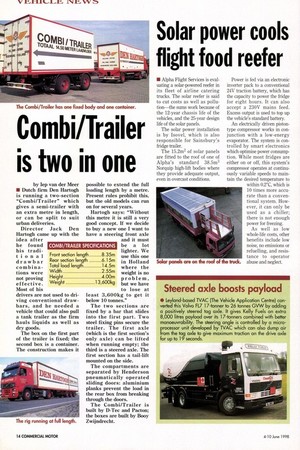Solar power cools flight food reefer • Alpha Flight Services
Page 16

If you've noticed an error in this article please click here to report it so we can fix it.
is evaluating a solar-powered reefer in its fleet of airline catering trucks. The solar reefer is said to cut costs as well as pollution—the sums work because of the 12-year chassis life of the vehicles, and the 25-year design life of the solar panels.
The solar power installation is by Isovel, which is also responsible for Sainsbury's fridge trailer.
The 15.2m2 of solar panels are fitted to the roof of one of Alpha's standard 38.5m3 Norquip high-lift bodies where they provide adequate output, even in overcast conditions. Power is fed via an electronic inverter pack to a conventional 24V traction battery, which has the capacity to power the fridge for eight hours. It can also accept a 230V mains feed. Excess output is used to top up the vehicle's standard battery.
An electrically driven piston. type compressor works in conjunction with a low-energy evaporator. The system is controlled by smart electronics which optimise power consumption. While most fridges are either on or off, this system's compressor operates at continuously variable speeds to maintain the desired temperature to within 0.2°C, which is 10 times more accurate than a conventional system. However, it can only be used as a chiller; there is not enough power for freezing.
As well as low whole-life costs, other benefits include low noise, no emissions or refuelling, and resistance to operator abuse and neglect.




















































































































